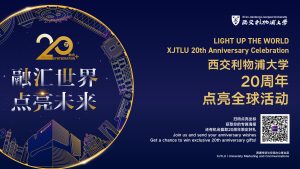Lecture 3

All

-
- Lecture 1: When Oxygen Goes Mad: A Wild Tale of Life and Chaos
- Lecture 2: Sustainability and ESG – finding hope in intelligent monitoring
- Lecture 3: Outlook on Creative Technology and the Creative Industry Driven by Digital and AI Technologies
- Lecture 4: Post-quantum cryptography – a New Era
- Lecture 5: AI & 5G/6G : From Buzzwords to Interdisciplinary Research
- Lecture 6: Zebrafish: the small brain to solve big scientific questions
- Lecture 7: From “Labor Intensive Manufacturing” to “Dark Factory”: A Journey to intelligent Biopharma 4.0
- Lecture 8: Winning the Global Narrative in the AI Era



Lecture 3
Speaker: Professor Miguel Baptista Nunes
Professor Miguel Baptista Nunes is Dean of the School of Internet of Things at Xian Jiaotong Liverpool University’s Entrepreneur College in Taicang. Prior to this appointment, Miguel was the Dean of the School of Information Management at Sun Yat-sen University, Guangzhou, China. Miguel was also the chair of the Asia-Pacific Chapter of the iSchools movement from 2018 to 2020; the Chair of the Asia-Pacific Chapter of the Association for Information Science and Technology (ASIS&T) from 2017 to 2018. Before SYSU and from 2015-2017, Miguel was a National High-end Foreign Expert at the School of Information Resources Management of the Renmin University of China, sponsored by the Chinese State Administration of Foreign Experts Affairs. In addition to his achievements in administration and research, Miguel was selected as one of the top ten “My Favorite Foreign Teachers in China” in 2019, National award sponsored by the Foreign Talent Research Center of the Ministry of Science and Technology. Prior to this recent Chinese professional experience, Miguel was at the Information School of the University of Sheffield in the UK for 23 years, 20 of those as a permanent member of academic staff, where he led the development of teaching & learning and research in the Information Systems discipline, with a keen perspective on the resolving bottlenecks and taking opportunity of cutting-edge trends in the discipline.
Topic: Socio-Technical Innovation through Design Science Research: Keeping away from obsolete Dichotomies in Information Systems Research
Abstract: Design Science Research is a research approach that emerged from Herbert Simon’s distinction between natural and artificial sciences. Artificial phenomena are those that are influenced and molded by human activity and therefore are not easily modelled by universal laws. DSR is predicated on the belief that science involving these artificial phenomena should be undertaken through the identification of reallife problems and the development of artefacts and constructs that may address these problems. Such artificial artefacts should be developed and conceptualized through iterative processes of generating alternatives and testing them against continuously changing utility requirements and constraints. The use of DSR aims to develop artefact or construct based solutions for identified problems rather than just produce explanatory theories about an existing technological reality. In the Information Systems (IS) discipline, this represents a significant evolution from quantitative deductive research approaches (e.g. theories of planned behavior, quantitative surveys, etc.) and competing qualitative inductive approaches (e.g. grounded theory, critical research, ethnography, etc.). This often partisan dichotomy led to fracturing discussions in the discipline and to a certain extent a slowing down in its development as a key emergent discipline.This lecture will discuss the value of IS as an engine for socio-technical innovation through the development of emerging theories that abstract the situated use of technological artefacts in a societal reality obsessed with technology and rapid fading trends.
Click to watch the Lecture Highlights